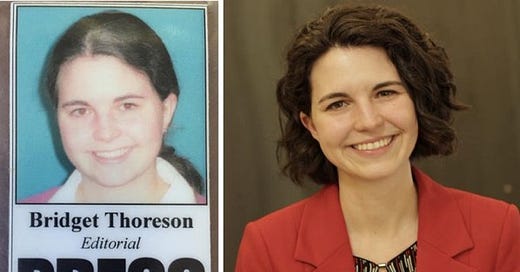Is switching careers unusual?
I prefer deep talk to small talk. So at my high school reunion earlier this year, I went around asking my former classmates, “What about your life now would most surprise your 18-year-old self?”
A few people said they’d be surprised by where they ended up living or whether or not they had kids, but by far most of them answered they’d be surprised by their professions. One who thought she’d be a teacher is now a lawyer, another was planning to become a scientist and currently works in UX.
“I never would have thought politics!” said the woman who now runs a congressman’s office.
Think back to your younger self, on the brink of leaving high school and setting out on your chosen path. What plans did you make? How have they shifted?
With all due respect to 18-year-old Bridget, I’m glad I haven’t stuck to every single idea I had for the future, including my career decisions. In fact, half of the companies where I’ve worked didn’t even exist when I was in high school.
I remember the pressure I felt when choosing my major, the sense that this was the first rung of a ladder I must pursue for the rest of my working life.
That line of thinking puts us at risk of continuing in jobs even after they no longer hold our interest or fuel our growth. I believe instead in navigating our careers as a continual process of discovery, which can sometimes mean changing careers.
Just how common is it to move into a new field? While the Bureau of Labor Statistics “never has attempted to estimate the number of times people change careers in the course of their working lives” (apparently it’s too tricky to define a “career change”) there are indications that it’s not only happening, but may be the norm:
“Some 53% of employed U.S. adults who quit their job in 2021 changed their occupation or field of work at some point last year … Younger workers were more prone to make the leap. Of employed adults ages 18 to 29 who said they quit a job in 2021, 61% shifted their field of work or occupation, compared to 45% of those ages 30 and older.” (Pew Research via CNBC)
“Most workers (78%) will change careers at least once in their lives.” (AARP)
“Workers will most likely not be with one company their entire career.” (Employee Benefit Research Institute)
At my reunion, I noticed that while my classmates were surprised by their career journeys, they didn’t seem embarrassed or ashamed that they had strayed from the path their teenage self envisioned. Many of them had an almost giddy look on their faces when sharing what they had discovered in the decades since graduation. It wasn’t too hard to see the younger versions of ourselves in those moments.
If you’re considering a switch, you’re far from alone. Don’t keep climbing just because you think you should. Instead, honor that inner teen who bravely left behind what they knew to pursue something new and challenging. That’s the real legacy that will help you discover your future.
Happy navigating,
Bridget
I’ll be back after the holidays for Job Hunt January, focusing on tips for a less stressful, more successful job hunt process. Feel free to send your questions or advice my way!



